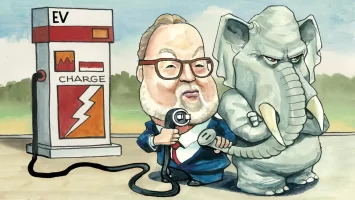
WITH WAR raging in Israel as well as Ukraine, President Joe Biden made an impassioned plea for America to act again as “the arsenal of democracy” by providing tens of billions of dollars of military aid to both allies. He adapted the idea of America as the “indispensable nation”—a concept coined by the late secretary of state, Madeleine Albright—to cast the country as the “essential nation”, vital to holding back the forces of aggression, be they terrorists or bully states.
Mr Biden drew a direct connection between Hamas’s slaughter of Israeli communities on October 7th and Russia’s invasion of Ukraine in February last year. “Hamas and Putin represent different threats, but they share this in common: they both want to completely annihilate a neighbouring democracy,” Mr Biden said in a televised address to Americans on October 19th. Another common thread, he noted, is that both foes are supported by Iran.
Mr Biden was seeking to harness bipartisan sympathy for the Jewish state to reaffirm the United States’ global role. “American leadership is what holds the world together. American alliances are what keep us, America, safe,” he declared.
He is also hoping the explosive crisis in the Middle East will bring a divided and paralysed Congress to its senses. It has been unable to pass bills because infighting among Republicans in the House of Representatives is preventing the election of a speaker. Mr Biden is reported to be preparing a request for roughly $100bn in supplemental funding for national-security priorities. If so, his calculation is that at least some sceptical Republicans will swallow the large pill of perhaps $60bn in additional aid for Ukraine by wrapping it in other causes they support more wholeheartedly—not least $10bn-14bn in aid to Israel, as well as help for Taiwan and funding to strengthen America’s southern border.
Mr Biden was speaking a day after visiting Israel, where he sought to prevent the crisis from spiralling out of control. Hamas’s onslaught killed about 1,400 Israelis, and led to the capture of over 200 hostages. More than 3,700 Palestinians have died in Israel’s retribution against Hamas in the Gaza Strip. Israel has cut off supplies of food, water, fuel and electricity to Palestinians there. Both sides traded blame for an explosion at a hospital on October 17th that killed scores if not hundreds of people: Palestinians say it was caused by an Israeli strike; Israel contends it was the result of an errant Palestinian rocket. Mr Biden, for his part, was adamant that it “was not done by the Israelis”.
Amid anti-Israeli protests across the Arab world and beyond, “all the indications are that the worst is coming,” said Jordan’s foreign minister, Ayman Safadi, at a press conference on October 19th. Despite Mr Biden’s efforts, a promised humanitarian corridor between Egypt and the Gaza Strip has yet to open. America vetoed a UN Security Council resolution calling for a “humanitarian pause” in the fighting because it did not recognise Israel’s right to defend itself. Israel’s defence minister, Yoav Gallant, signalled that ground operations in Gaza, which may prove to be an even bloodier phase, would begin “soon”.
Signs are growing that Iran is pushing its proxies to expand the conflict. On Israel’s northern border with Lebanon, Israeli forces and Hizbullah, a powerful Shia militia created by Iran, have been exchanging artillery and missile fire for days.
Meanwhile south of Israel, in the Red Sea, an American guided-missile destroyer, the USS Carney, intercepted three cruise missiles and several drones launched by the Houthi militia in Yemen, another Iranian ally, towards targets assumed to be in Israel. The action on October 19th raises the prospect that the expanding fleet of American warships in the eastern Mediterranean—one American aircraft-carrier strike group has been deployed there and a second is on its way— may yet intervene if Israel and Hizbullah go to war.
Separately, American bases in Iraq and Syria have been repeatedly attacked with drones and rockets in recent days, according to the Pentagon. It did not identify the attackers, but they are likely to be pro-Iranian militias. “Any response, should one occur, will come at a time [and] in a manner of our choosing,” a spokesman said.
Despite growing left-wing protests, and the resignation of a State Department official, Mr Biden did not waver from his embrace of Israel. “We’re going to make sure other hostile actors in the region know that Israel is stronger than ever—and prevent this conflict from spreading.” At the same time, though, he said Israel had to operate “by the laws of war” and protect civilians.
He repeated the call he made in Israel, drawing from America’s encounter with al-Qaeda’s terrorism in 2001. “When America experienced the hell of 9/11 we felt enraged as well. While we sought and got justice, we made mistakes. So I caution the government of Israel not to be blinded by rage.” He also urged Israel not to “give up on peace” based on a two-state solution: that is, the creation of a Palestinian state.
Mr Biden’s speech pinballed between Israel and Ukraine. Republicans, in particular, have grown increasingly sceptical of the cost of supporting Ukraine’s war against Russia, now nearly 20 months old and close to stalemate. “If we walk away and let Putin erase Ukraine’s independence, would-be aggressors around the world would be emboldened to try the same,” Mr Biden said, arguing that conflict and chaos could spread around the world.
Giving support to American allies and partners, he said, was “a smart investment that’s going to pay dividends for American security for generations,” Mr Biden insisted. It would help keep American troops out of harm’s way. He also argued that the money for Ukraine was being spent on American-made weapons, and served to replenish America’s own arsenal with more modern weapons. Patriot air-defence missiles were made in Arizona, he noted; 12 states were involved in the manufacture of artillery shells.
With an eye on the 2024 elections and questions about whether, at the age of 80, he is able to campaign for and serve a second term, Mr Biden highlighted his wartime visit to Kyiv in February and his recent trip to Israel, boasting that he was “the first American [president] to enter a war-zone not controlled by the United States military since President Lincoln”. ■



